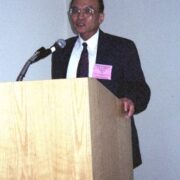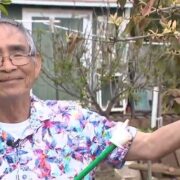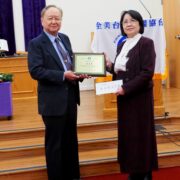KENBO與APO
作者 朱耀源
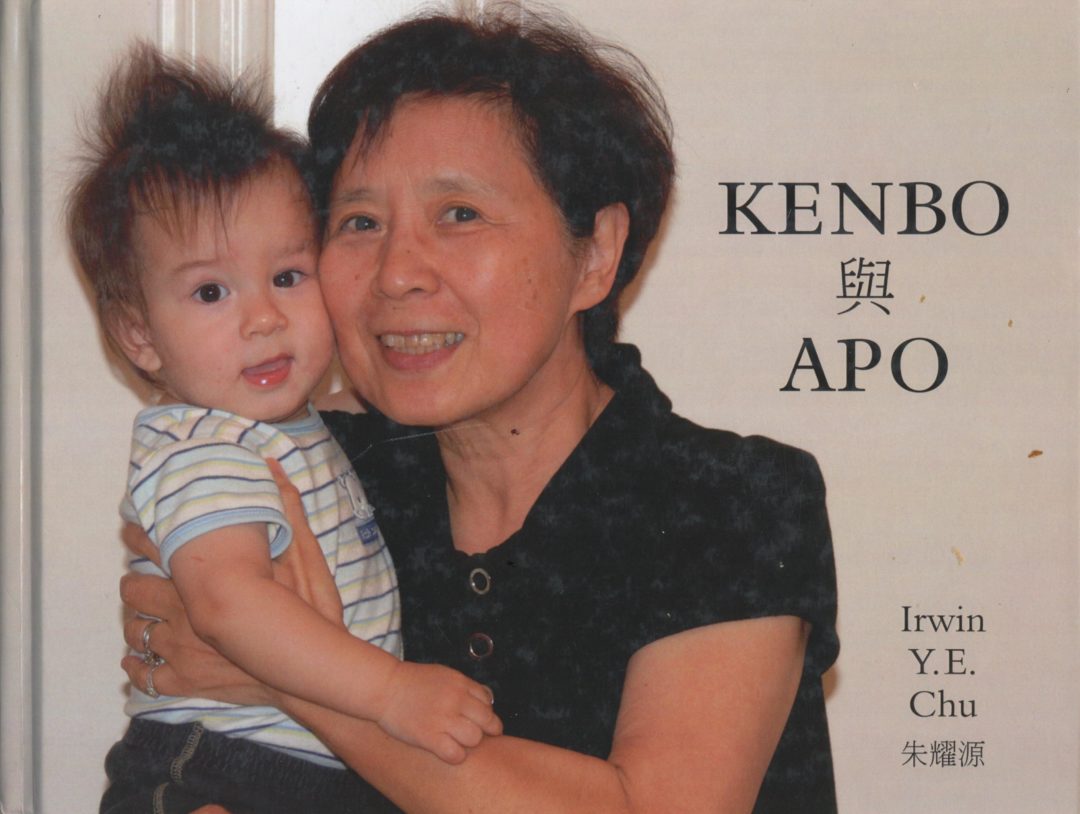
前言
Foreword
我的長孫英文名叫Hamilton Y.Chu,中文名叫朱育賢,日本小名叫KENBO,取之於「賢坊」。在家也叫他Munky。APO則是由客家話的祖母而來。
孫子對任何祖父母而言都是最可愛,最聰明,最討人喜歡的。這几乎沒有例外。有人說不如此說的祖父母應去看心理醫師。由生物學而論,每個孫子都繼承了你和你老伴各四分之一的基因,否定自已還可以,侮辱到你老伴那可不得了,問題大了。
同時我總覺得孫子也像一本書。書可放在書架上,偶而看一下確認它的存在,也可以摸摸書面書背,要看可以跳頁看,當然也可以從第一頁看到底,更可以看几頁就閉眼深思反複回味,更當然看幾十篇都不腻的人大有人在,我就是一個。
再說要好好看孫子這本書就不應該像是在學校課堂上看,不能有義務,不該被強迫。有義務的話,那就沒辦法放開思維觀察。在照顧自巳兒女時有一大堆責任與義務,只有幸苦,與看孫子時很不一樣。對我而言最重要的是我由孫子這本書學到很多。而且這些都是七十歲以前沒注意到的新事務。
實際上我們每星期平均見兩三次。兩歲前帶他去公園,抱抱,走走,玩沙。兩歲後每星期他一個人來我家過夜,週末找個時間與KENBO家人一起吃飯。這些時間大部份由我們決定,自由自在。有事就跳過。
好話講盡,由於我愛過頭,常常會掉落在溺愛的深淵而不能自拔。以致傻A-KONG,呆A-KONG,笨A-KONG的尊稱相接而來。最後淪落為最沒出席的A-KONG,天下最賤的A-KQNG。更糟的是我本人還自鳴得意,欣然全盤接受,沒藥可救了。
這是365天X3 = —千多天的記錄與故事。算來一共照了15,000張照片。所以平均每天照十四張,消除的還不算,有點可怕。這種照像頻率只有大熊貓的成長記錄比得上。我沒照Video,一則我的技術不佳,二則沒辦法用在出版上。
這本書已孕釀了好久,始終動不了筆,太深入了,人在其中,好像在濃愁愁的旋渦裏根本無法動蕩。只好放下一陣子,從新看所累積的一萬五千張照片,選出一干四百張沖洗出來,全部排在書房地板上,搞得沒地方走路。最先依照項目分類開始,再寫文章內容,再回過頭來選出可以上書的數百張,不足的部 份再回到原檔案再找,這才完成了初步的書本內容。這過程就花了兩年。
這本書只寫到KENBO三歲為止,2011年二日二十七日就是這本書的結尾。有兩個原因,第一:再寫下去也是沒完沒了,而且三歲之後也太複雜,太多人為因素,對我而言自然的純真不多了。第二;KENBO的弟弟Reason,加上他的雙胞胎堂弟Casey和Lucas也出生,我的腦袋也裝不了那麼多。
我總覺得KENBO與APO有很奇妙,又特別的緣份。例如KENBO第一句會叫的話就是APO,明知APO在近旁而看不見就會併命叫APO,APO到處找,直到看到為止。與APO玩後離開時非親一下不可,沒好好說再見就離開就會非常傷心,甚致有次要麻煩他媽媽SANDY打個電話補一句再見。KENBO與APO之間調皮倒蛋之事又特別多,因此這本書的名字決定為“KENBO與APO”。
Hamilton Y. Chu is my first grandson. His Chinese name is Chu Yu-Shien. The word “Yu” means “to educate, to cultivate, and to nurture.” “Shien” is the word for “virtuous, worthy, and able.” Usually, I call him “Kenbo. ” This nickname is what one would lovingly call a boy with the name “Shien” in Japanese. He is also called “Munky” at home. “Apo” is an affectionate way of addressing one’s grandmother in Hakka, a Taiwanese dialect.
One’s own grandchildren are always the loveliest, smartest, most precious things in life. If you don^ feel this way, a visit to the psychiatrist is in order. Biologically, every grandchild inherits one fourth of their genes from each of his or her grandparents. If you don^ think you have the best grandchildren, well, it might be okay to slight yourself, but you should be wary of insulting your better half (your old wife)— there could be serious consequences!
A grandchild is also like a rare, treasured book. This could be a book that you keep on the shelf. Once in a while, you gaze upon it and touch its cover to make sure that it s really there. At times, you might flip through your favorite pages, close your eyes, and savor the images.
Some people read their favorite book time and time again with a tireless obsession. I am one of those guys.
Reading the book of a grandchild is not the same as reading a homework assignment. You do not do it out of obligation. Because it is something you want to do, your mind opens up, and your observation skills sharpen. The situation is also very different from the experience of raising your own kids. When you are the parent, there are so many responsibilities weighing on your shoulders that it is very hard to step back and be objective. Even at 70 years old, I continue to learn many new lessons from the book of Kenbo.
My wife and I usually saw Kenbo two to three times a week. Before he was two, we usually just walked around or played in the sandbox at the park with him. At age two, Kenbo started coming to our home by himself and spending one night each week with us. On weekends, the entire family would find time to have a meal together.
When it comes to Kenbo, I only ever think about what is good for him. My own self-esteem is the last thing on my mind. As a result, I don’t always act in a way that people would call “dignified.” Others might think I spoil him. Laughing at my unusual behavior, my wife and some of my friends sometimes call me “Stupid A-Kong, ” “ Weird A-Kong, ” “Crazy A-Kong, ” “World’s Cheapest A-Kong.” I never let them bother me. In fact, I was quite proud! I realized that my infatuation with Kenbo was simply beyond remedy!
This book is a collection of stories and observations from more than one thousand days of Kenbo’s first years of life. In total, I have taken more than 15,000 pictures—a record-keeping effort comparable to that for the endangered giant panda. I didn’t make many video recordings because I wasn’t as good at it. Plus, video clips are not suitable for publishing.
I had planned to write this book for a long time, but because I was so deeply and emotionally invested, it was hard to put the words on paper. I started by printing 1400 photos from my collection and laying them all out on the floor of my study room. For a while, there was no space to walk. I sorted them chronologically and by activity and began to write the content for each chapter. The first draft took me two years to finish.
This book covers Kenbo’s life until February 27, 2011, his third birthday. After this milestone, his life became more complex, and it was harder for me to keep up with the details. Plus, the arrival of his younger brother, Reason, and his twin cousins, Casey and Lucas, significantly expanded the Chu family. My old brain was getting overwhelmed.
A very wonderful and special relationship exists between Kenbo and his Apo. The first word he ever uttered was “Apo.” Even when they were in the same house, Kenbo would not stop calling,44Apo! Apo!,? until he made eye contact with her. One time, the two of them parted ways without exchanging a goodbye kiss. Kenbo felt so sad. When they got home, he insisted that his mom, Sandy, call Apo on the phone so he could say a proper goodbye. In addition to these moments of affection, there were so many incidents in which he behaved in a naughty way or was having fun with his grandma. That is why I decided to title this book Kenbo and Apo.
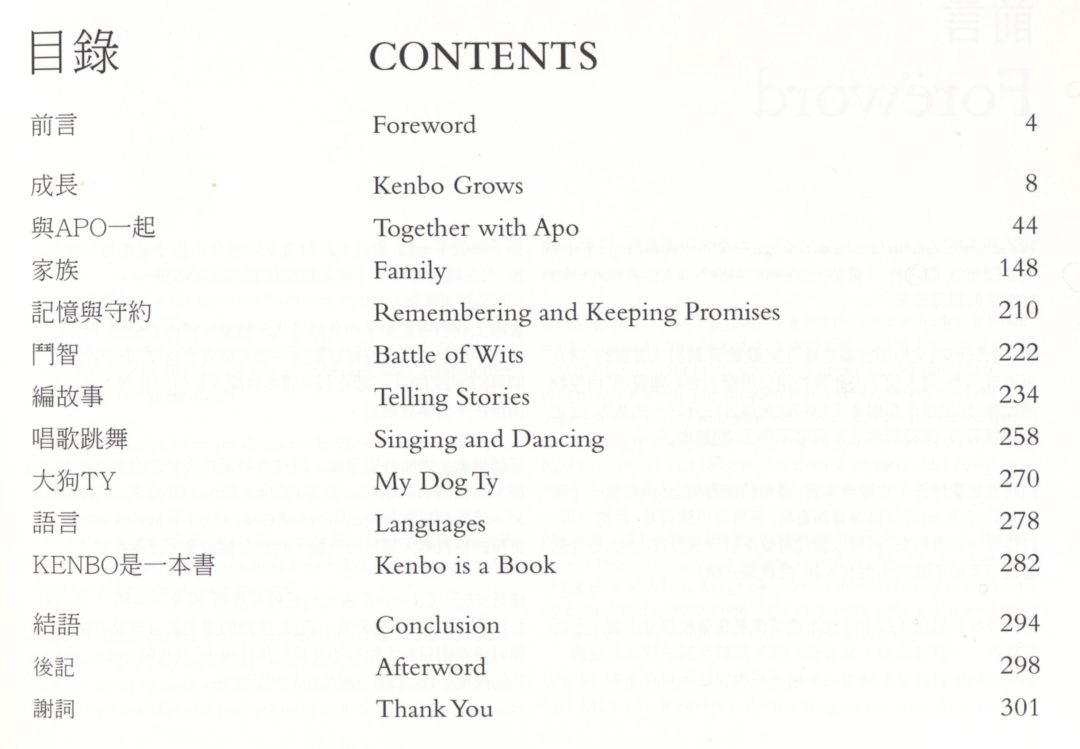
Published in 08/2013
Donated by Dr. I. Chu 06/2018
Posted in 07/2018

